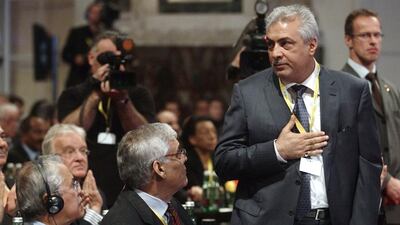Opec, of which the UAE is an important member, starts meeting about two weeks from now in Vienna. Participating in sideline discussions with the 12 Opec members will be many non-Opec producers, including Russia, Norway, Brazil, Mexico and numerous oil companies.
The big question is whether the important producing countries will be able to reach a comprehensive production agreement to stabilise the price of oil, which has gyrated from a high of US$115 per barrel last June to a mid-January low on Brent crude of $46, costing them and countless energy and financial companies hundreds of billions of dollars. And, if they can come to an accord, at what level will the oil price be stabilised?
This figure will certainly not be $100 per barrel, but will it be $50 or $60 or $70, or will it continue its zig-zagging course in the absence of an accord?
The reason for the big assembly of oil producers is the two-day Sixth International Opec Seminar, an event held every few years at which the great and the good of the oil world hold forth on big energy issues of the day.
This year the seminar will be addressed by industry leaders such as Ali Al Naimi, the Saudi oil minister, and the UAE energy chief Suhail Al Mazrouei, along with a host of luminaries of the IMF and the World Bank as well as the chief executives of all the supermajor oil companies.
Informal discussions between big producing countries will take place ahead of the seminar in Vienna hotel suites because all parties have a vested interest in stabilising the oil market. But there are formidable obstacles to sharing out production among so many different actors to achieve a just price for a non-renewable resource.
At the moment the large GCC producers are maintaining that they can no longer underwrite stabilisation of the world oil market. This has been the case ever since Saudi Arabia officially announced to the world at the November Opec meeting that it was abdicating the role so many expected it to pursue as the swing producer, underpinning prices at $100 per barrel.
Instead, Mr Al Naimi insisted Riyadh had accepted the realities of the modern world of shale oil and numerous other sources of oil production increases, concluding that the kingdom’s new emphasis had to be on preserving the Saudi long-term share of the oil market, not guaranteeing a high price for all producers.
Saudi policy started to shift last summer to one of taking on the competition from shale, oil sands and large offshore projects head on. Its “market share” emphasis was immediately echoed by the UAE, Qatar and Kuwait, which had already been pursuing this priority for some time by steadily adding to productive capacity.
Saudi Arabia has to contend not just with rising output from some Opec members, but also a sea change in the world oil market in which US shale oil production came from nothing to peak March production of 5.7 million barrels per day in just a few years. The change placed America once again in the premier position among world oil producers, with crude and natural gas liquids output of 13.6 million bpd. This has eclipsed even Russia, where liquids production is running at 10.5 million bpd.
Of course, US shale output is now falling off because of high natural decline rates, but the International Energy Agency in its latest monthly oil market report pointed to stronger than anticipated output gains in Russia, China, Colombia, Vietnam and Malaysia. Longer term there will be an additional 3.8 million bpd in large new offshore projects in Brazil and Norway and continued expansion in Canadian oil sands production.
Large rises from Iraq and possibly Iran may also be on the cards.
Saudi Arabia clearly has a lot to contend with, and there is a sense in which the undeclared price war being fought under the banner of defending market share represents policymakers collectively throwing their hands up in the air.
But the tough stance carries with it a very high price for all Opec members in terms of government revenue, and it is easy to see why Venezuela, Iran and Algeria are strongly advocating a return to Opec quotas and $100 oil. Of course, there is zero chance of this happening with the current GCC resolve to do battle with shale and other high-cost sources.
Yet there exists a slim probability of an accord between major Opec and non-Opec producers early next month to evenly share the burden of some production limits and prevent prices from returning to the $40s or below. A Saudi official said this was a hidden desideratum of its policy of holding other producers’ feet to the fire. But he stressed that Russia and the rest would have to sign on in blood for Riyadh to provide any support at all on the price front.
Whether this wishful thinking becomes a reality or not will become clear a fortnight from now in Vienna. This is why so many from around the world will be attending the Opec Seminar, or waiting in hotel lobbies at close hand, awaiting the result of the hard bargaining among major oil producers.
James Crawford is a long-time observer of Opec and managing director of Inter Emirates General Trading, which works on deals in the resources sector
business@thenational.ae

